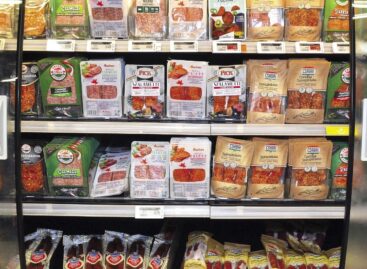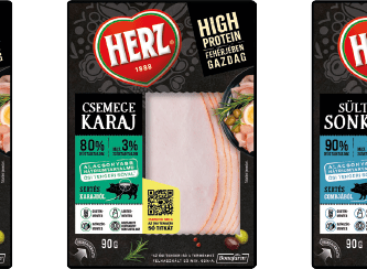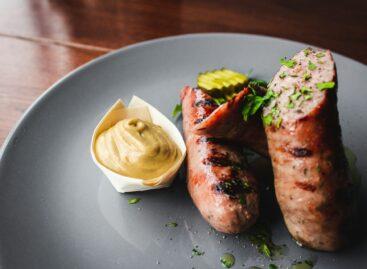In every era processed meats are in line with the trends
The ingredient and energy price increase has reached the category of processed meats too, which translated into higher consumer prices this year. Salami sales could grow in both value and volume, but sausage sales decreased in the last 12 months.

Henriett Szabó-Spanyol
senior brand manager
Pick Szeged
Henriett Szabó-Spanyol, Pick Szeged Zrt.’ senior brand manager: “Shoppers like to try new flavours in the salami and sausage categories, but they always return to the classic versions. PICK is trying to give added value to consumers, so from time to time we put 11% more salami in the popular PICK products – this is indicated by a promotional sticker on the packaging.”
Taste is the most important factor

Éva Tamáskovitsné
Gila
marketing manager
Gyulahús
Éva Tamáskovitsné Gila, Gyulahús Kft.’s marketing manager: “Due to the price increases, the market underwent a bit of a restructuring: shoppers visit stores less often, but they buy more. Consumers like sliced, pre-packaged products, while buying from the deli counter has lost ground a little. It is really good news for us that consumer trust in branded products continued to grow during the pandemic.”
Recently Gyulahús has conducted a consumer survey, and this revealed that the majority of people do eat meat and processed meat despite the recent vegan trend. Demand has increased a little for hot salamis and sausages. Hungarians like characteristic taste when they want to eat salami or sausage, and this is true regardless of their age.
Offering experiences after COVID

András Benkő
sales and marketing director
Kaiser Food
András Benkő, Kaiser Food Kft.’s sales and marketing director reckons that one of the top trends is the strengthening of private label products: “This is rooted in the conquest of discount supermarket chains. It is also because of this that pre-packaged product sales are growing the fastest. We are innovating even in this difficult period. Consumers like classic taste in sausage, but they wish to choose from more flavours when buying salami.”

Tamás Kováts
sales director
Trade Group
Europe
Tamás Kováts, Trade Group Europe Kft.’s sales director opines that the food market is undergoing major transformation at the moment, because of the regular price increases and the changing consumption habits they entail: “Smaller size and lower-priced products are becoming popular, and promotions can drive sales. In the 250g mini salami category we launched 5 coated salami variants: parmesan, black pepper, Mexican, herbs and muesli.”
Packaging: less plastic
Pick Szeged Zrt., the category’s market leader came out with the Szalametti product range last year, which soon became very popular, especially among young consumers. This year they added two new flavours to this selection, cheese and black pepper. The company is really proud to have cut plastic packaging use by 60 tonnes in just 2 years. They could do this by reducing the shrink wrap thickness by 24%. In addition to this, in 2022 the tray size of several sliced products bearing the Less Plastic seal became 3cm smaller, by which plastic use dropped another 14%. Pick Szeged Zrt.’s plans include slashing paper use by 30% until 2023, and within 5 years manufacturing tray products in only 100% recyclable packaging. In the first half of 2022 PICK salamis received a new packaging design.
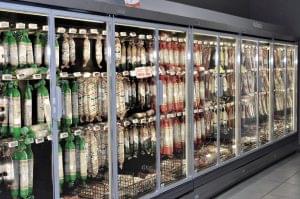
Though promotions are attractive, taste is still the most important factor for consumers
In the spirit of love
Gyulahús implemented a major image change in the autumn of 2021, but this didn’t bring a drop in product sales. In connection with this, the company made a television commercial built around Gyulai’s traditional values, and around the phenomenon that Hungarians like to express their love through food. This theme continued with the May-June campaign this year, with www.szeretemagyulait.hu as the main message, a page where shoppers find recipes and useful tips. //
Stronger performance from private label salamis and dry sausages
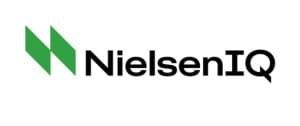

Guest writer:
Luca Horváth
junior analytic insights associate
NielsenIQ
NielsenIQ’s retail index has revealed that Hungarians spent 3% more on processed meat products between June 2021 and May 2022 than in the base period, but at the same time they purchased less from these products. It is noteworthy that shoppers didn’t buy less dry sausage and salami in spite of the rising prices – they took home more than 22,000 tonnes of these. The main place for buying such products were 401-2,500m² stores, where sales increased by 5% in value and 2% in volume.
Volume sales of private label salamis and dry sausages grew by 7%, while manufacturer brands saw their volume sales decrease by 5% – although the latter still have a more than 60% market share. There was a shift in demand towards smaller size: volume sales of products smaller than 250g jumped 7%, while those bigger than 500g suffered a 5% sales droop. Pre-packaged products are responsible for nearly three quarters of dry sausage and salami value sales. //
Inflation affects cured meat product sales too
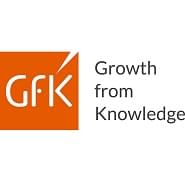

Guest writer:
András Kuntner
business development
manager/retail
GfK
GfK’s Consumer Scan data reveal that Hungarian households purchased cured meat (salamis and sausages) every second week in the 1 July 2021-30 June 2022 period. On average they bought 8.2kg, which was 7.3% less than in the base period. Families went to discount supermarkets for buying cured meat products the most often, 12 times in the examined period.
A growing proportion of households prefer pre-packaged products. The category’s penetration rate remained 97%. Sales of pre-packaged cured meats were up 1.3%, but 5% less salami and sausage was sold from the deli counters of shops. Branded product sales dropped 4%, while private label salamis and sausages underwent a more than 16% sales growth. Online cured meat buying only has a 1% share in total sales, but sales nearly doubled in comparison with the base period. //
This article is available for reading on pp 98-102 of Trade magazin 2022.08-09.
Related news
Sausages, salamis, tactics
🎧 Hallgasd a cikket: Lejátszás Szünet Folytatás Leállítás Nyelv: Auto…
Read more >Related news
(HU) METRO Gasztro Fesztivál a SIRHA Budapesten – Élmény, inspiráció és valódi megoldások a HoReCa-szakmának
🎧 Hallgasd a cikket: Lejátszás Szünet Folytatás Leállítás Nyelv: Auto…
Read more >

